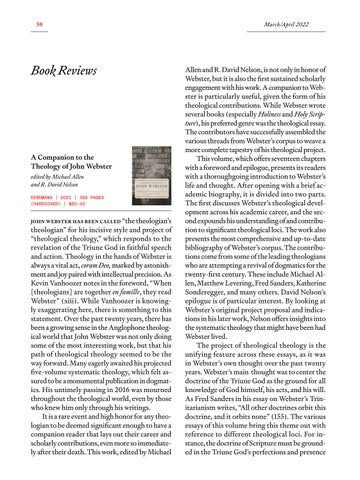58
Book Reviews
A Companion to the Theology of John Webster edited by Michael Allen and R. David Nelson EERDMANS | 2021 | 366 PAGES (HARDCOVER) | $50.00
JOHN WEBSTER HAS BEEN CALLED “the theologian’s
theologian” for his incisive style and project of “theological theology,” which responds to the revelation of the Triune God in faithful speech and action. Theology in the hands of Webster is always a vital act, coram Deo, marked by astonishment and joy paired with intellectual precision. As Kevin Vanhoozer notes in the foreword, “When [theologians] are together en famille, they read Webster” (xiii). While Vanhoozer is knowingly exaggerating here, there is something to this statement. Over the past twenty years, there has been a growing sense in the Anglophone theological world that John Webster was not only doing some of the most interesting work, but that his path of theological theology seemed to be the way forward. Many eagerly awaited his projected five-volume systematic theology, which felt assured to be a monumental publication in dogmatics. His untimely passing in 2016 was mourned throughout the theological world, even by those who knew him only through his writings. It is a rare event and high honor for any theologian to be deemed significant enough to have a companion reader that lays out their career and scholarly contributions, even more so immediately after their death. This work, edited by Michael
March/April 2022
Allen and R. David Nelson, is not only in honor of Webster, but it is also the first sustained scholarly engagement with his work. A companion to Webster is particularly useful, given the form of his theological contributions. While Webster wrote several books (especially Holiness and Holy Scripture), his preferred genre was the theological essay. The contributors have successfully assembled the various threads from Webster’s corpus to weave a more complete tapestry of his theological project. This volume, which offers seventeen chapters with a foreword and epilogue, presents its readers with a thoroughgoing introduction to Webster’s life and thought. After opening with a brief academic biography, it is divided into two parts. The first discusses Webster’s theological development across his academic career, and the second expounds his understanding of and contribution to significant theological loci. The work also presents the most comprehensive and up-to-date bibliography of Webster’s corpus. The contributions come from some of the leading theologians who are attempting a revival of dogmatics for the twenty-first century. These include Michael Allen, Matthew Levering, Fred Sanders, Katherine Sonderegger, and many others. David Nelson’s epilogue is of particular interest. By looking at Webster’s original project proposal and indications in his later work, Nelson offers insights into the systematic theology that might have been had Webster lived. The project of theological theology is the unifying feature across these essays, as it was in Webster’s own thought over the past twenty years. Webster’s main thought was to center the doctrine of the Triune God as the ground for all knowledge of God himself, his acts, and his will. As Fred Sanders in his essay on Webster’s Trinitarianism writes, “All other doctrines orbit this doctrine, and it orbits none” (155). The various essays of this volume bring this theme out with reference to different theological loci. For instance, the doctrine of Scripture must be grounded in the Triune God’s perfections and presence






